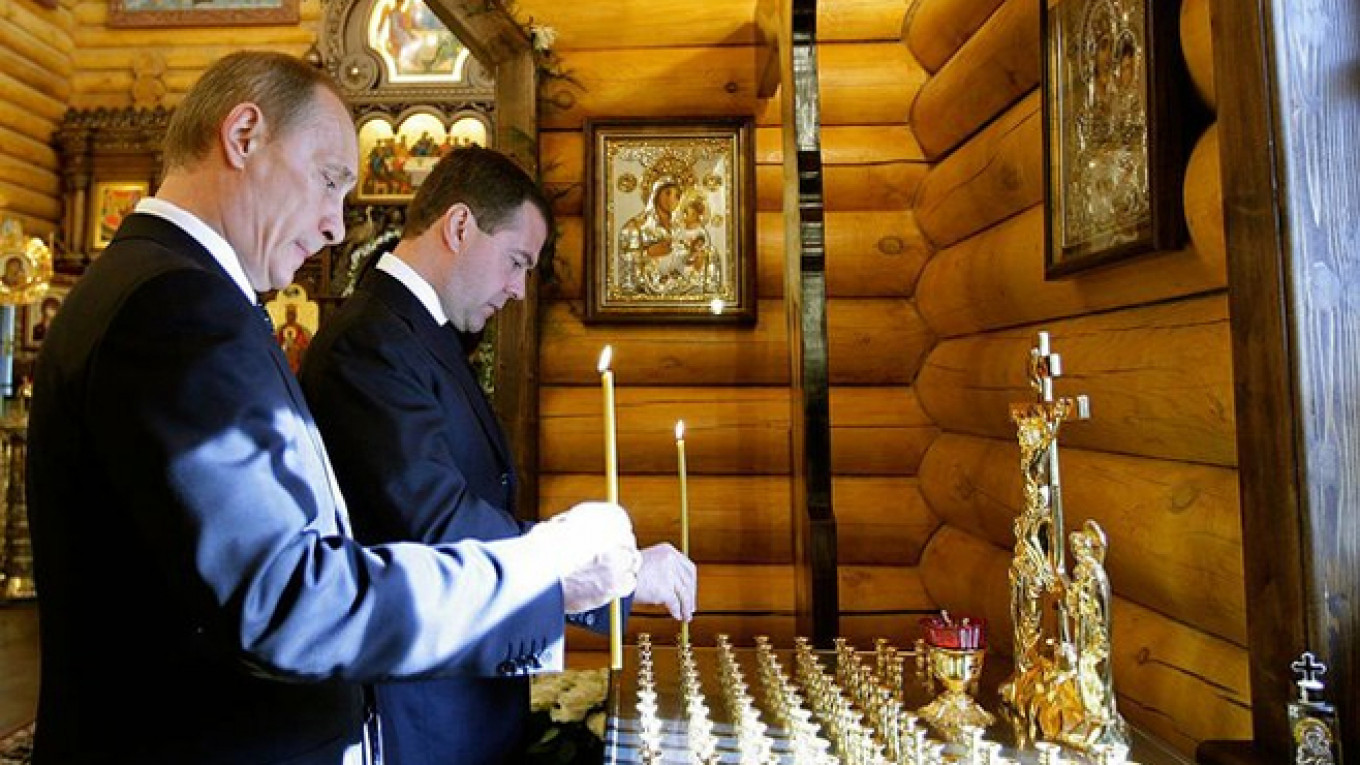Духо́вные скре́пы: spiritual bonds
This week in Russia the WTF-o-meter has been going off the charts. First, Yevgenia Vasilyeva, sentenced to five years in prison for embezzling millions from the state budget, was released on parole after spending less than a month in jail, presumably because she just couldn't get a good mani-pedi in the joint.
And then on a new Orthodox television channel, President Vladimir Putin was portrayed as the new, improved, Orthodox Christian version of Alexander the Great. Over footage of Putin flying with the cranes and scuba diving for amphorae, the woman newsreader explained the сакральный смысл (sacred meaning) of this. It was just like Alexander, you see, who flew to heaven on a beast's wings and rode a glass sphere to the bottom of the sea. As Hollywood movie scenes of legions of Macedonian soldiers marched across the screen, she joyfully shared the Good News: Евразийская империя вновь становится реальностью (The Eurasian Empire will once again become a reality) thanks to Vladimir Putin — because, apparently, nothing expresses God's love for the world like thousands of pagan soldiers heading off to plunder, rape and kill.
What are they thinking? Does a film director look at this stuff and say: Отлично! Снято! (Great! It's a take!) Deeply disturbed, I decided it was time to tackle a phrase that's been around for a while: духовные скрепы (spiritual bonds). It comes from Putin's speech before the Federation Council in December 2012: Мне больно сегодня об этом говорить, но сказать я об этом обязан. Сегодня российское общество испытывает явный дефицит духовных скреп (It's painful for me to speak of this, but speak I must. Today Russian society clearly has a deficit of spiritual bonds). These bonds, he said, included милосердие, сострадание, сочувствие (charity, compassion, empathy).
At the time, the phrase drew puzzled glances. It's very lofty language. You might come across скрепы (bonds) in church literature: С первых шагов вера и Церковь стали одной из надёжных скреп местной жизни (From its first steps, faith and the Church became one of the strong bonds holding together local life). Or find them as metaphors: Его "ничего не хочу, ничего не желаю" звучит в театре как формула отчаяния, когда порваны все скрепы с жизнью (In the theater his "I want nothing, I desire nothing" sounds like an expression of despair, when all the ties with life are sundered).
Oddly enough — and to the great delight of journalists at the time — spiritual bonds were also mentioned frequently by a Russian thinker not usually associated with higher matters — Alexandra Kollontai. This early Soviet proponent of free sex wrote a great deal about душевно-духовные скрепы (soulful spiritual bonds) and their importance for balancing sexual instinct. At least I think that's what they were supposed to do; I got sidetracked by her крылатый Эрос (winged Eros) and Эрос бескрылый (wingless Eros). Don't ask.
But people also snickered about the phrase. Скрепы are more often down-to-earth things — clamps and fasteners. Брусья соединены металлическими скрепами (The lumber is held together with metal clamps). And скрепки are those things you use in the office every day. Called скрепки для бумаг in office supply catalogs, these are paperclips. The Internet was flooded with images of paperclips twisted into church spires.
So what was the president suggesting — that we link ourselves together with religious paperclips?
Here's my suggestion: Let's strengthen those bonds of милосердие, сострадание, сочувствие (charity, compassion, empathy) and add to them здравый смысл (common sense).
Michele A. Berdy, a Moscow-based translator and interpreter, is author of "The Russian Word's Worth" (Glas), a collection of her columns.
A Message from The Moscow Times:
Dear readers,
We are facing unprecedented challenges. Russia's Prosecutor General's Office has designated The Moscow Times as an "undesirable" organization, criminalizing our work and putting our staff at risk of prosecution. This follows our earlier unjust labeling as a "foreign agent."
These actions are direct attempts to silence independent journalism in Russia. The authorities claim our work "discredits the decisions of the Russian leadership." We see things differently: we strive to provide accurate, unbiased reporting on Russia.
We, the journalists of The Moscow Times, refuse to be silenced. But to continue our work, we need your help.
Your support, no matter how small, makes a world of difference. If you can, please support us monthly starting from just $2. It's quick to set up, and every contribution makes a significant impact.
By supporting The Moscow Times, you're defending open, independent journalism in the face of repression. Thank you for standing with us.
Remind me later.








